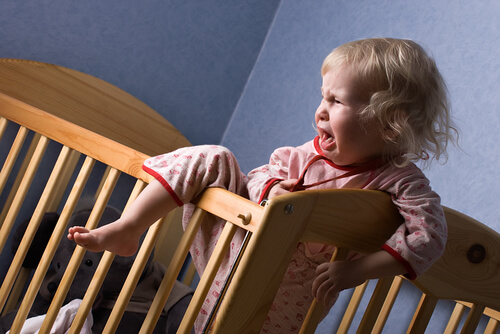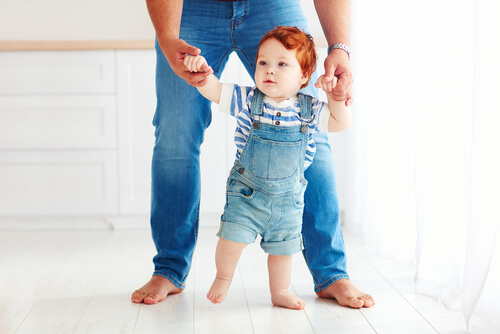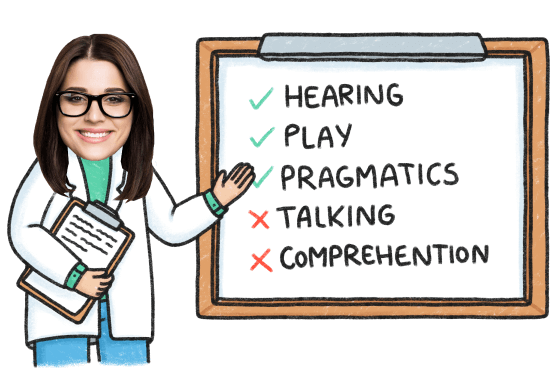Leaps and Regressions - First 18 Months of Life
Feb 6, 2022 Ugh - nothing is worse than finally getting your baby on a schedule or “figuring them out,” when BAM - a developmental or mental leap happens and they go through a sleep regression.
After having two kids, one of which had no signs of sleep regression and one who clearly has restless sleep during certain periods, I can say these regressions are no joke and are exhausting for parents to go through.
Why do these regressions happen and how long do they last?
Sleep regressions typically occur when a baby is going through a mental or developmental leap. If you read online, you’ll see that these leaps occur periodically throughout the first 18 months of life. After that, kids go through changes, but it doesn’t impact them as significantly. Each regression/leap lasts a different amount of time depending on the changes that are occuring throughout your child’s body. One leap might only last 20 days, while others can last up to 45 (those are the worst).
Once your child has gone through a couple of these developments, you might be able to start predicting when a leap is imminent or when they are in an actual leap. For my son, he sleeps worse, fights sleep, is more fussy and wants to be held more. Looking back on it, my daughter was the same, but not as severe as my son.

What Are the Leaps?
Leap 1 – Around 5 Weeks
This leap is when your baby will start to learn about new sensations that impact their body. They might realize when you are tickling them or will react more dramatically if they are scratched or feel pain. You might also see a slight sleep issue around this first leap. Again, newborns aren’t on a schedule, so it’s hard to tell if it’s a sleep regression or if baby is just being a baby.
Leap 2 – Around 8 Weeks
Leap two is when your child will start to recognize patterns. For instance, if you have a book that has black and white checkers, the baby might stare at the book trying to figure out what the picture is. They might even “watch” tv because they will like the fast-moving images that they see. Because they are starting to see patterns, don’t be surprised if your baby starts to grab for objects that are in front of their face!
Leap 3 – Around 12 weeks
Baby will start to learn about transitions during this period. This is one of the biggest neurodevelopmental leaps since being born, so it’s a big one. Baby will go from having jerky movements to having smoother, more deliberate body movements.
Leap 4 – Around 19 Weeks
Leap 4 is the events leap. This is where you will see your baby start to choose certain toys over others, will start to look for items, stick their hands in your mouth and will start looking for you when you leave the room. This leap usually coincides with the four month sleep regression. This one hit us hard and our son started waking up more frequently and fought his naps during the day!
Boost Your Child’s Speech Development!
Improve language & communication skills with fun learning!

Leap 5 – Around Week 26
Babies will start to pay lots of attention to smaller details or parts of toys and other objects. You might even catch your baby looking under a blanket or rug if they can’t find a toy. This is also where babies will go through draws and cabinets and empty everything that they can grab! Get ready for some fun!
Leap 6 – Around Week 37
Sorry – but you’ll be going through a mental leap and a sleep regression for this milestone. In fact, this seems to be the biggest leap that kids will go through! Babies will start to imitate your facial expression and make silly faces in front of a mirror. Get ready for some mood swings, too because baby will be super dramatic during this phase of their life!
Leap 7 – Around week 46
Babies start to get super fun around this age because they can actually start playing with you. They will raise their arms when you ask, try to put three pieces of a puzzle together and imitate you when you cook. This is where big sisters or brothers are great because they can entertain the baby by playing simple games!
Leap 8 – Around week 55
Babies are able to find something that you hid by giving simple directions! You can actually start to see their little brains working at this point. Scribbling is also another great activity for you to work on with your growing baby. It won’t look like anything and he/she might try and eat the paper, but it’s all part of learning!

Leap 9 – around week 64
If you can’t find that pen, be careful and watch your baby because this is the point where they enjoy stealing and stashing objects that they find. They also try and get their own way, which leads to some more temper tantrums and being pushy!
Leap 10 – Around week 75
This is the last leap that your baby will go through! It was a relief for me once my daughter went through this last leap. I felt like she became a different toddler once she was over it! Remember those scribbles on paper that your baby would do? Now, they are able to make circles and create simple patterns!
I loved knowing when leaps happened because it made me better predict my children’s fussy periods. These timelines are estimated, some children may be earlier and some may be later. My daughter was showing signs of a leap a little after the weeks I listed and my son was showing signs a little before.
Every child is different and will experience each leap differently. My tip for the sleep regressions? Just breathe. Trust me, it passes. Stick to a routine/schedule and within a week, they get over the hump!
Have a question for our Speech Therapists?


Hello,
My daughter is now almost 15 months old and is going through the 9th leap. I’ve noticed that her speech has regressed a bit. She used to say mama and dada and would try to repeat words that we would try to teach her but now she just babbles. Is this normal?
I’m there with you! My son is almost 15 months old and just entered the 9th leap. As far as a regression, I wouldn’t exactly call it that. At this age, children are like sponges and are trying to compartmentalize and figure out how to best communicate and express themselves. Although it may seem like she is going backwards in regards to speech, it may be that she is learning how to produce other sounds. Please listen to her babble and see if you can hear any new sound productions! If not, please let us know and we can give you some more things to look for to see if it’s a true regression.
Stacie Bennett, M.S. CCC-SLP
I hope you are doing well. I am writing to seek some help for my 18 old niece. She used to say a few words and babble until a few months ago but now she goes aaa aaa and doesn’t say a word. we are getting worried about her. Could you please help us.
Is she able to imitate any kind of language? Is she moving her mouth when she attempts to produce words? Is she gesturing to show you what she wants? At around 18 months of age, we expect kids to have a range of 5-20 words. These words can be the word exactly, or what we call approximations. These approximations sound like the adult form of a word, but have the normal articulation and phonology patterns of a toddler. For example, if your niece says “dow” for “down,” we consider that a word. If she still has no true words and seems to be regressing, I would talk to her pediatrician and see if further evaluations are necessary.
Stacie Bennett, M.S. CCC-SLP